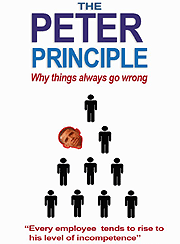 by Ronald E. Riggio, Ph.D. –
by Ronald E. Riggio, Ph.D. –
How and why do incompetent people rise to the top?
Why are there so many incompetent leaders? Is your boss less than competent? How about that department head in accounting or HR that doesn’t know his/her job? How in the world do incompetent people rise to the top in many organizations? Here are the reasons:
We Don’t Do a Good Job of Selecting Leaders. We simply don’t invest the time or resources needed to select the best people for jobs. Time and time again, we take hiring shortcuts. We interview in a haphazard way, and select the person who appears best in the interview. The problem is that often the best performer in the interview is one of the least competent workers (they’re so good in the interview because they get so much practice, because they are often fired!).
We don’t invest the time needed to do a thorough selection, which includes asking how applicants deal with specific situations (situational interviewing). We don’t structure interviews or spend enough time with candidates. We don’t bother to check references. We don’t take enough advantage of employment tests and other hiring technology. As a result, we get what we pay for – few resources invested = poor outcome.
We Rely too Much on Seniority. The Peter Principle is the notion that people rise in organizations to their level of incompetency. When we give too much weight to seniority, we are in trouble. In today’s competitive, mobile job market, seniority may actually be an indicator of poor ability (no other company would hire the person).
Our Bureaucratic Structures Drag Us Down. Tired bureaucracies often lead to poor leader selection. They value seniority because they don’t invest the resources to actually measure performance. People who follow the rules to the letter, get ahead, while rule breakers are punished. [There is recent research that suggests that the best leaders question the rules and engage in moderate rule-breaking – especially when the rules are a detriment to good performance.]. Bureaucracies also tend to hire from within, which leads to a lack of quality and creativity in the workforce.
We Settle for Mediocrity. Often we settle. We choose the “devil we know” over the unknown. We stick with someone who plays by the rules and will “stay the course,” rather than the outsider who may get us to “think outside the box” and try something new and innovative. Time and time again, I’ve seen companies do national and international searches for leaders, yet settle for a mediocre leader who is already in the company.
So, what can be done to fight the Peter Principle? Engage in best hiring practices and put in the necessary time, energy, and technology. Work hard to evaluate everyone’s performance, so that we know who our best performers actually are. Engage in thoughtful leader development within the organization and invest time in succession planning. Organizations that invest the time and technology are the ones who get the best leaders.
HT: Leadership Quarterly (read full article)
